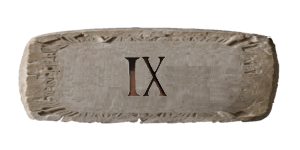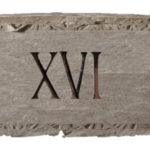Or IX in Roman Numerals

The Roman numeral for 9 is represented as “IX.” It is formed by subtracting 1 (I) from 10 (X), resulting in the value 9.
In Roman numerals, this subtractive notation is commonly used to represent numbers like 9, 40 (XL), 90 (XC), and 900 (CM) more efficiently.
The Roman numeral “IX,” which represents the number 9, is interesting from a historical and mathematical perspective because it demonstrates the use of subtractive notation in the Roman numeral system. This subtractive notation makes Roman numerals more efficient for certain numbers.
Here’s what’s notable about “IX” (9 in Roman numerals):
- Efficiency: The Roman numeral “IX” is more efficient and compact than the additive form “VIIII” for representing the number 9. The Romans used this subtractive notation to streamline the writing of numbers and reduce the number of characters needed in inscriptions and calculations.
- Historical Significance: The use of subtractive notation is a historical artifact that provides insight into Roman numeral usage in ancient times. It showcases the ingenuity of Roman mathematicians and their desire to create a concise and practical numeral system.
- Foundation for Larger Numbers: Understanding how Roman numerals work for smaller values like 9 is essential for working with larger Roman numerals. For example, the Roman numeral for 99 is “XCIX,” where the “XC” represents 90 and “IX” represents 9. Knowing how to subtract values is a fundamental aspect of working with Roman numerals.
In summary, while the Roman numeral “IX” may not have any particular cultural or historical significance beyond its role in the Roman numeral system, it is a practical and efficient representation of the number 9, showcasing the unique characteristics of Roman numerals.
Decimal to Roman Numerals Converter
Example:

